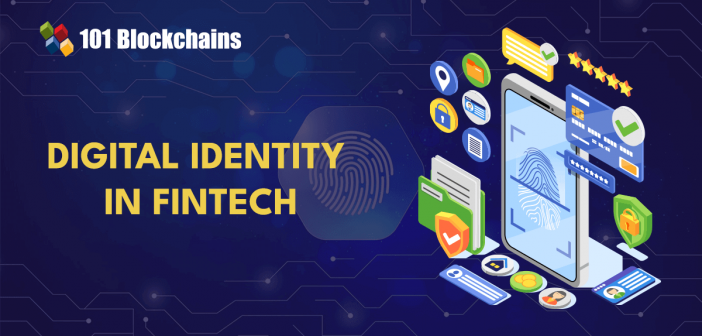Learn how blockchain truly works, master key definitions, and uncover what makes smart contracts so "smart." Dive into the fundamentals, gain valuable insights, and start your blockchain journey today!

- FinTech
James Howell
- on November 17, 2023
The Evolution of Digital Identity in FinTech
The digital era has introduced multiple changes, including remote transactions and completely virtual communication. It is important to understand that trust is a crucial factor for interactions with businesses or utilizing specific services. Therefore, digital identity is an important requirement for proving the authenticity of different parties and verifying that you are human.
The evolution of digital identity in fintech is an example of how technology plays a vital role in financial services. How can fintech service providers reduce risks of fraud? What is the ideal instrument for authenticating transactions? The best answer to these questions points to verification of customer identity. You might argue in favor of Know Your Customer or KYC procedures that financial service providers use for verifying customer identity.
The problem with existing KYC processes is that most of them are manual, fragmented, and paper-based. Therefore, organizations would have to rely on multiple techniques for collecting and verifying the identity of customers. The scope for fintech digital identity is clearly visible in the rising volume of digital transactions. Codified digital identities could help in authentication of customers with reduced paperwork and support fintech adoption. Let us learn more about the importance of digital identity in fintech and the impact of decentralized identity on fintech.
Understanding Digital Identity
Before you discover the answers to “What is digital identity in fintech?” you must understand the meaning of digital identity. As of 2022, the global digital identity solutions market had a capitalization of almost $28 billion. The market would most likely achieve a capitalization of over $70 billion by 2027.
The growth of digital identity solutions can be attributed to increasing digital transformation of services, user convenience, technological advancements, and emerging cybersecurity concerns. Digital identity is the digital representation of the identity of a person or entity. It helps in establishing trust alongside facilitating seamless and secure financial transactions in virtual environments.
The review of digital identity in fintech examples would show you that digital identity includes different types of personal information. Digital identity includes the name, date of birth or incorporation, and address. It also includes other identification documents such as government-issued IDs, passports, and driver’s licenses. The growth of digital transformation and online transactions has brought digital identity under the limelight as a crucial aspect of financial services. Digital identity could enable secure and seamless experiences for customers with financial services.
Learn more about the concept of decentralized identity with this Decentralized Identity Fundamentals Course.
How is Digital Identity Relevant for Fintech?
The implementation of digital identity in fintech could help service providers verify the identity of customers without different types of identification. It features different attributes shared by customers with fintech service providers. If you want to understand the prospects for future of digital identity in fintech, then you must know how it has been implemented in fintech.
You can also notice how innovative technologies such as distributed ledger technology and biometrics are expanding the functionalities of digital identity. Digital identity in fintech could be implemented through passwords, security credentials, PINs, biometrics, or a combination of different identifiers.
Fintech service providers facilitate authentication of all digital identifiers through a single channel to allow users to capitalize on fintech services. You can understand the responses to “What is digital identity in fintech?” with better clarity by referring to a practical example of implementing digital identity in fintech. You can take the example of a system that incorporates video-based digital identification for a fintech app. How would the digital identity system work for fintech apps? The answer would point you towards the following steps.
- Comparison of an individual’s face with the image provided on the ID documentation.
- The digital identification system would also feature a user-friendly interface for facilitating better engagement.
- The digital identity in fintech examples for video-based KYC verification would also emphasize the necessity of digital forensics for detecting false or forged identities.
- Digital identity systems with video-based verification could facilitate sophisticated encryption of data in communication and transit.
- Another important highlight in the implementation of digital identity for fintech solutions with video-based verification would include real-time geolocation alongside IP address recording.
It is also important to note that fintech companies also utilize passwords, biometrics, and other tools for verification to determine authenticity of digital identity in fintech.
Learn more about the new generation of financial services with this interactive Fintech Skill Path.
Important Principles of Digital Identity
The next important highlight for understanding the evolution of digital identity in fintech points to the important principles for digital identity. You can utilize the three principles for verifying the effectiveness of digital identity solutions for fintech. Here is a brief description of the three crucial principles of digital identity.
-
Uniqueness
The first principle for guiding the development of digital identities points to uniqueness. Digital identifiers used in fintech should be unique, thereby ensuring that every user in the system has a distinct identity. At the same time, it also ensures that the fintech system links digital identities to only one person. On the contrary, you can find an exception for uniqueness principles in social media accounts.
-
Authenticity
Another crucial aspect of digital identity refers to authenticity. Fintech solutions should embrace authentic digital identities that conform to the principles of government and private-sector institutions. It is important to ensure security and reliability for verification of user identities to access fintech services or create bank accounts.
-
Consent
The most crucial aspect in answers to “What is digital identity in fintech?” would also draw your attention towards the principle of consent. Digital identities of users must be created with their informed consent. Therefore, users should register and use their digital identities according to their own wishes.
It is also important to ensure that users have a clear understanding of the personal data that would be collected and who would have access privileges to the data. Consent is a mandatory principle for ensuring safeguards for privacy alongside allowing users to have complete control over confidential data.
Discover how Financial technology is disrupting the industry with the Fintech Fundamentals Course.
Types of Digital Identity Solutions for Fintech
The principles of digital identity provide a clear description of how it can serve as a major force for change in fintech. Now, you must learn about the types of fintech digital identity solutions to understand the different options for implementing digital identity in fintech. Digital identity solutions involve a combination of processes, standards, and technologies, working in combination to safeguard privacy, security, and integrity of digital identities. Here are some of the notable types of digital solutions that have been implemented for fintech.
-
Multi-factor Authentication
One of the most common instruments for implementing digital identity in fintech points to multi-factor authentication or MFA. The applications of MFA require two or more forms of identification from users, such as a one-time password or a verification code sent directly to their phones.
-
Biometric Authentication
The next prominent addition among types of digital identity solutions for fintech points to biometric authentication. You can discover the future of digital identity in fintech with biometric authentication, as it could help in identity authentication through the unique physical characteristics of an individual. For example, fingerprints, voice recognition, and facial recognition provide secure and faster methods for identity verification.
-
Identity and Access Management Solutions
Identity and Access Management or IAM solutions are software tools that help in managing user authentication alongside accessibility of digital resources. IAM tools can ensure that only users with valid authorization can access important information or implement certain actions.
-
Blockchain-based Identity Verification
The introduction of blockchain in the domain of digital identity could spell some transformative changes in the world of fintech. Blockchain-based identity verification offers an opportunity to transform existing digital identity in fintech examples with decentralization. Blockchain technology helps in storing and verifying digital identity on a distributed ledger, thereby providing a decentralized, transparent, and secure approach towards digital identity.
-
Self-Sovereign Identity
Self-sovereign identity, or SSI, is a decentralized approach to implementing digital identity. Additionally, users can also leverage SSI to exert control over identity information for secure sharing of digital identity information.
Build your identity as a certified blockchain expert with 101 Blockchains’ Blockchain Certifications designed to provide enhanced career prospects.
What is the Importance of Digital Identity in Fintech?
The best way to understand the importance of digital identity in fintech focuses on identifying how it serves value to the world. Most of the insights on fintech digital identity solutions focus on how they help in verification of user identity. On the contrary, it contributes to increased inclusion in the domain of fintech.
As of now, more than two billion people all over the world do not have legally recognizable proof of identity. Therefore, they are unable to access government assistance, job opportunities, financial products, and medical care. Digital identity systems could help in onboarding such users in the fintech domain without depending on the legacy infrastructure.
According to McKinsey, countries that embrace digital identities could unlock new financial opportunities and improve fiscal values. The research provides a glimpse of the future of digital identity in fintech as digital identity could unlock fiscal values ranging from 3% to 13% of the GDP of countries by 2030. Interestingly, different countries have implemented digital ID solutions successfully under the guidance of government organizations or consortiums. In addition, digital identity in the domain of fintech could also provide the following value advantages.
- Improved security.
- Easier customer onboarding.
- Better and inclusive customer experiences.
- Precise compliance with AML/KYC regulations and norms.
- Cost efficiency.
- Seamless integration.
- Fraud prevention.
Read this article to understand the Impact Of Blockchain On Digital Identity.
Why Does Fintech Need Decentralized Identity?
The digital identity of an individual in the domain of fintech is a representation of the individual and their liabilities for a specific fintech solution. However, existing digital identity systems are centralized in nature and could lead to concerns for user privacy. In such cases, decentralized identity or DID has emerged as a promising solution.
Decentralized identity provides a new perspective on answers to “What is digital identity in fintech?” by enabling verification of user identity without involvement of centralized intermediaries. In simple words, decentralized identity allows users to control their digital identity without depending on specific service providers.
The fintech industry needs a decentralized identity as a solution for barriers to customer onboarding. As a matter of fact, around 25% of fintech apps in the UK are abandoned due to complexity of the registration and onboarding processes. Decentralized digital identities could solve these problems by providing easier accessibility to financial services. On top of it, decentralized identity systems also allow users to take complete control of managing their digital identities.
Excited to learn about FinTech and how it works? Check out Fintech Guide Presentation now
Challenges to Adoption of Digital Identities in Financial Services
The value of digital identity for fintech serves as an encouraging factor for adoption of digital identity systems. However, adoption of digital identity in fintech would present some formidable challenges. You can come across digital identity in fintech examples with prominent challenges for implementation, including technical challenges.
On top of it, resistance to the transition from traditional systems for identity verification can also present challenges to adoption of digital identity solutions. Furthermore, it is also important to pay attention to the problems due to lack of interoperability and standardization in digital identity systems.
Examples of Digital Identity in Fintech
The potential of digital identity for solving different fintech issues creates curiosity regarding examples of digital identity in the real world. Mastercard is one of the best examples of fintech digital identity with a decentralized system for identity verification. Mastercard announced its collaboration with Samsung and Idemia in 2021 for launching a biometric payment card featuring decentralized digital identity functionalities.
Analyze the benefits and challenges of using AI in Fintech with this AI and FinTech Masterclass.
Conclusion
You could notice how digital identity can revolutionize the fintech sector by developing trust between businesses and users. Fintech has provided a major milestone for transformation of the domain of financial services. On the other hand, the evolution of digital identity in fintech could also introduce decentralized digital identity solutions.
Users can embrace new digital identity solutions in fintech to make the most of advantages such as barriers to accessibility. Meanwhile, it is also important to pay attention to the emerging challenges for adoption of digital identity in fintech.
You can learn about the solutions to challenges of adopting digital identity, such as awareness and selection of secure digital identity solutions. Furthermore, fintech service providers must also focus on standardization of digital identity solutions alongside enabling interoperability. Learn more about the fundamentals of fintech and discover how digital identity can transform fintech.






